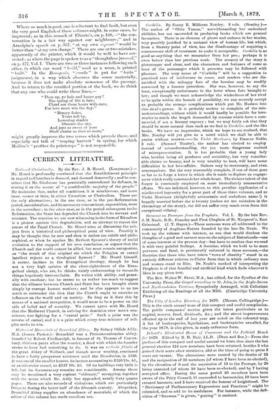Cordelia. By Fanny E. Millicent Nottley. 3 vols. (Bentley.)— The
author of " Olive Varcoe," notwithstanding her undoubted
abilities, has not succeeded in producing books which are general
favourites. There is an element of gloom and sadness in her stories, very possibly justified by a rational view of human life, but which,
from a literary point of view, has the disadvantage of requiring a
consummate skill of treatment to make it acceptable. Cordelia is as good as anything that we remember from her pen ; perhaps it is
even better than her previous work. The scenery of the story is picturesque and clear, and the characters and fortunes of some at least of the personages which it presents may be followed with pleasure. The very name of " Cordelia " will be a suggestion to practised ears of misfortune to come, and readers who are dis- satisfied with the unhappy fate of the heroine may be readily answered by a famous precedent. She was, however, to say the least, exceptionally unfortunate in the lover whom fate brought to her ; and though we must acknowledge the wickedness of her rival to be quite within the bounds of possibility, we can scarcely accept as probable the strange complications which put Mr. Haslam into this rival's power. It is probably useless to complain of the mis- understandings, without which it would hardly be possible for love.
stories to reach the length demanded by reasons which have a com- mercial, if not a literary cogency ; but we may fairly ask that they
should be more natural than such as we find in Corde/ia, and the like books. We have an impression, which we hope to see realised, that Mrs. Nottley will yet give us a novel which we shall be able to praise without reserve.—In Violet Mortimer, by Frances Noble, 3 vols. (Samuel Tinsley), the author has elected to employ instead of misunderstanding, the yet more dangerous method of misrepresentation. It is too probable that a young lady
who, besides being all goodness and amiability, has very consider- able claims to beauty, and is very wealthy to boot, will have some difficulties in her love-affairs. Suitors may be mercenary, and even unscrupulous. But she may reasonably complain, if one of them goes so far as to forge a letter in which she is made to deplore an engage- ment which really commands her whole heart. The sinister talent of the forger is commonly employed on more immediately remunerative efforts. We are indebted, however, to this peculiar application of a misdirected ingenuity for a great part of these three volumes, and as Violet Mortimer (delightfully aristocratic and melodious name !) is happily married before she is twenty (unless we are mistaken in the chronology of the story), she did not suffer very much even from this exceptional villainy.


































 Previous page
Previous page